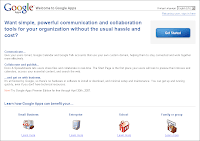
The
Cleveland Clinic Annual Intensive Review of Internal Medicine is in its 19th edition this year and since members of the Section of Hospital Medicine actively participate in the course, we started to think of ways to make it more Web-friendly. I was appointed a director of web-based development for the project.
The course already has an
accompanying book and CD-ROMs which were
reviewed very favorably in JAMA.
I was asked recently to be the director of web-based development for the 19th edition of the course. We are looking for some "Web 2.0 ways" to make this well-established course more interactive and closer to the minds of the new generation of physicians who see the world through "Google eyes."
I listed below a few services we are considering for future use, feel free to add your comments and suggestions.
1. Google Video to host course lecturesWe could upload most of the course lectures on Google Video/YouTube and make them freely available and searchable. Additional options include allowing videos to be embedded in other sites and blogs, and downloaded to video iPods. If content owners do not agree to provide lectures for free, we could probably charge a reasonable price of $ 2-5 per video to watch and download.
A similar approach is already used by
UC Berkeley and by our own
Health Edge team at the Cleveland Clinic.
2. Google Groups for question-and-answer sessionsThe
new version of Google Groups has morphed into an online collaboration platform which can be used for question-and-answer sessions between course attendees and faculty. A simple website can be built within Groups using Google Page Creator, and up to 100 MB of files can be hosted on Groups.
Google Groups design can be customized to fit the Cleveland Clinic brand and logo requirements.
3. Video iPod with course lecturesWe could offer individual Cleveland Clinic-branded video iPods with all the lectures pre-loaded and available for education on-the-go, when exercising or traveling.
A similar approach is used by
The Arizona Heart Institute to educate patients about cardiovascular disease and surgery. Cleveland Clinic Center for Continuous Medical Educations already features
free audio and video podcasts for health professionals. The series started with the Sessions from the
18th Annual Intensive Review of Internal Medicine. You can either listen/view podcasts online or subscribe with iTunes.
4. PicasaWeb to host clinical images and EKGsPicasaWeb slide shows automatically adjust to the monitor size of the user. I already use this service for our
procedure-teaching articles.
5. Convert PowerPoint presentations to online Flash slide showsCourse attendees may not need PowerPoint installed on their computers to view the course presentations.
Slideshare.net converts PowerPoint files to Flash slide shows which can either be embedded in web sites/blogs or shared via email.
References:
Attend Conferences Without Being There. LifeHack.org.
Video iPod for Your HeartVideo Podcasts by The Cleveland ClinicUC Berkeley Free Webcast Courses18th Annual Intensive Review of Internal MedicineThe new Groups experienceConvert Powerpoint Presentations to Flash Slideshows with Slideshare. Amit Agarwal.
Free Audio and Video Podcasts for Health Professionals by Cleveland ClinicBuilding a Site in the Times of Google. Google Operating System, 01/2007.
BioMed Central's You Tube channel: videos from BioMed Central's authors and editors, 09/2007.
Image source: OpenClipAart.org (public domain)
Related:
Most Popular Educational Technologies. Life as a Healthcare CIO, 04/2008.
Updated: 04/15/2008
 Daniel Schwartz and Jordan Weinstein are two nephrologists from the Division of Nephrology at the University of Toronto who have launched a number of interesting medical education projects recently:
Daniel Schwartz and Jordan Weinstein are two nephrologists from the Division of Nephrology at the University of Toronto who have launched a number of interesting medical education projects recently:






